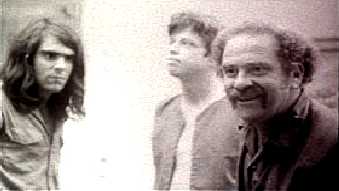
David Lindsay
(My complete GMD bio/commentary
is here).
Bibliography
David Lindsay, a fellow Scotsman, admitted the inspiration of two authors on his own work--Friedrich Nietzsche, and George MacDonald. Lindsay was a adherent of Gnosticism. It shows in everything he wrote but in nowhere more than his first novel--A Voyage to Arcturus--published in 1920. Like most young Scots, he was raised a Calvinist, but not much is known about Lindsay's early life or what led to his Gnostic beliefs. We only know that, after coming home from WWI, he (almost on a lark it seems) decided he was to become a writer. Lindsay would indeed write six novels and one play before his death in 1945. Unfortunately for him (and his wife) none of the stories were particularly successful, and the couple made what money they could running a boarding house. Lindsay had the hard luck of being most likely the only person in the history of the world to come home from a war relatively unscathed only to have a bomb drop on his own house many years later while sitting in the bathtub during the bombing of Brighton in WWII. Supposedly this was the first bomb dropped on the city. He remained shell-shocked for life.
Arcturus is the work mostly associated with David Lindsay today. It has influenced writers such as Harold Bloom, Philip Pullman, J.R.R. Tolkien, and C.S. Lewis. No one would accuse it of being well written. Its dialog is clumsy and its characters lifeless though sundry. However, it's credited as having been one of, if not the first, novels of fantasy that took place on a different planet. Its strength lies in its diversity of atmosphere and the philosophical environment of its creatures.
The Gnostic premise of Arcturus was that typical chestnut of Gnosticism concerning a man on a path of discovery who finds that his world is a false reality created by a false god (demiurge). In the end he discovers that even he has a false face of his own (thus the character's name--Maskull), and Lindsay may well owe the emergence of this doppelganger (although Maskull and his double don't look anything alike) to George MacDonald's stories in which doppelgangers appear often enough. Much of the tale shows an interest with MacDonald's novel--Lilith. Lindsay places his main character on another planet with constantly changing landscapes and an oddball assortment of creatures (not so different from the alternate world behind the looking glass in Lilith). He also has a female portraiture that corresponds to Lona. Her name is Joiwind; she's very tall, very naÔve, and she speaks in the same short, stabby, childlike sentences as Lona.
Although the exact antithesis of Arcturus, C.S. Lewis would also base a character on Lona in his Perelandra adventure named--Tinidril. Lewis, in a letter, once referred to Arcturus as being nearly diabolical and so Manichean as to be almost Satanic. However, for some strange reason, he originally got the idea of writing the first entry of his space trilogy after reading Lindsay's book even though he detested Lindsay's philosophy. Why he didn't get the idea from reading Lilith just as Lindsay had (considering Lewis had already read Lilith first) is an imponderable.
 A
Voyage to Arcturus was adapted and filmed in 35mm in
1970 by student filmmaker William Holloway and released in
16mm by Brandon Films on the art school circuit the
following year. The film was later restored and released on DVD
in 2006 by CustomFlix. Below is a still from the film of
the sťance scene with Maskull on the left, the apparition
in the middle and Krag on the right:
A
Voyage to Arcturus was adapted and filmed in 35mm in
1970 by student filmmaker William Holloway and released in
16mm by Brandon Films on the art school circuit the
following year. The film was later restored and released on DVD
in 2006 by CustomFlix. Below is a still from the film of
the sťance scene with Maskull on the left, the apparition
in the middle and Krag on the right:
The six novels of David Lindsay are as follows, listed chronologically according to their release dates:
- A Voyage to Arcturus (1920)
- The Haunted Woman (1922)
- Sphinx (1923)
- The Adventures of Monsieur de Mailly (1926)
- Devil's Tor (1932)
- The Violet Apple and The Witch (1976)
And one play:
- A Christmas Play (2003)